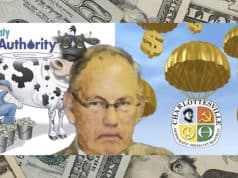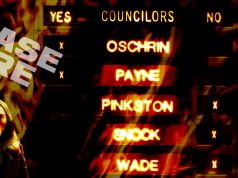Charlottesville resident, Louis Schultz, who previously was arrested by Charlottesville police in the course of defending his private property (see above video), is fighting back.
In an open letter to Charlottesville City Council, Schultz has accused Charlottesville City Manager, Maurice Jones, and a host of other city officials, of “conspiracy to seize property for a public use under color of law.”
Shultz’s efforts to ameliorate the City’s transgressions through communications with city attorney, Craig Brown, have failed, as Brown has discontinued the conversation.
Mr. Schultz will appear before Charlottesville City Council tonight in order to present his concerns.
Read Louis Schultz’s open letter to the Charlottesville City Council regarding illegal property seizures on Steephill Street:
Notes Regarding Steephill St.
Our Town Charlottesville Meeting Oct. 3 2013
Woolen Mills Chapel
1819 E. Market St
CharlottesvilleSteephill St. is recorded in a deed dated September 1887 as having been created during the subdivision of property formerly owned by Thomas Farish. The deed is accompanied by a plat showing 18 new lot and four new streets. Steephill is not named as such, but is clearly delineated on that plat as a street. The deed has a note on it indicating that “the streets on said plat are for the benefit of the lots laid off on the same.” Due to it’s size, that plat isn’t attached, but a Sanborn map dated Feb. 1920 follows on a later page.
Although other streets created by that plat have been accepted as city streets, Steephill Street has not been accepted as a public road nor is there any record of it’s dedication to the public right of way despite having long been erroneously described by city officials as a “dedicated but unaccepted street.” Although mistaken regarding dedication, those statements clearly indicate that the city doesn’t consider itself to be responsible to maintain the street. There are no known records of any easements of any type having been granted to anyone for any purpose.
A document prepared by the Office of the City Attorney entitled “Determining the Status of Alleys Within the City” states regarding streets created before 1946 – “If the original subdivision plat states that a street[s] or alley is “reserved for the use of the adjoining property owners,” or similar language, then it is a private way and there are no public rights, interests or obligations therein.”
Despite each having been fully informed in writing that Steephill Street is private property, Charlottesville City Manager Maurice Jones, Director of Public Works Judith Mueller, Utilities Director Lauren Hildebrand, and others in the employ of the City of Charlottesville conspired and on April 29, 2010 subsequently acted to seize that property for a public use under color of law.
That was the 4th such illegal seizure since 2000 and involved excavation of a buried sewer pipe. The other 3 seizures involved the wooden bridge.
In each of these cases, a city official determined that an improvement to the property was a danger of some sort to the public. Since no records indicate anything else, it has to be assumed that those improvements were privately built. It is clear that they lie on private property.
If a public official believes that blighted private property constitutes a danger to the public, that official is required by State and City Codes to follow a procedure that includes, requesting permission to inspect the property, notifying the affected property owners if blight is determined to be a problem, and requiring an abatement plan. If there is no response within 30 days, the director may request the planning commission to conduct a public hearing and make findings and recommendations concerning the repair or other disposition of the property in question.
According to City Code, “the planning commission shall report its findings and recommendations concerning the repair or other disposition of the blighted property to the city council. Upon receipt of findings and recommendations from the planning commission, the city council may, after an advertised public hearing, affirm, modify or reject the planning commission’s findings and recommendations. If the repair or other disposition of the property is approved, the city may carry out the approved plan in accordance with the approved plan and applicable law.”
In April 2010, all city officials involved were fully informed that Steephill Street is private property and chose to ignore the law and the procedures that it requires and seize the street for a public purpose anyway. It is arguable however that Frank Shifflet, the official that ordered the replacement of the bridge deck in 2001 was unaware that Steephill was not dedicated as a public street. There is no excuse though for his failure to determine what the city’s legal rights and responsibilities were before proceeding to rebuild a portion of the bridge. By that failure, he violated the applicable laws regarding condemnation of private property.
The city’s repairs to the deck consisted of replacing a few main timbers and the decking without repairing the stone foundation. A guard rail was added as well.
By the time of a letter dated October 30, 2003 Neighborhood planner Claudette Grant was describing the bridge as “City property.”
The city’s efforts to repair the bridge were so shoddy that by July of 2006 the bridge deck was rotten had become very dangerous.
In response to a letter to the city noting the dangers that the bridge presented at that time, city engineers, again ignoring the laws regarding condemnation of private property unilaterally acted on July 19. 2006 to cover the deck with large steel plates. I began correspondence with the city attorney in an attempt to determine what the city planned to do and to attempt to rectify the legal issues surrounding responsibilities for the bridge.
Despite the city attorney’s insistence that I would be an informed participant in the discussion regarding the future of the bridge, I was completely surprised on October 12, 2006 to receive a call from my wife informing me that a city crew had appeared and was replacing the bridge deck. I drove back to Charlottesville from Blacksburg to find out what was going on. On October 13, 2006 at a meeting in City Attorney Craig Brown’s office to ask questions about him misleading me in our correspondence, I was told unequivocally by Development Services Manager Angela Tucker that I had no say in anything that happened with the bridge.
The foundation had already been in disrepair before 2001. Water channelled towards the foundation as a result of a Neighborhood Development Services approval of paving the Southern end of the street over my objections in 2004 has been steadily eroding the mortar holding the stonework in place. Neither city re-decking project made any effort to repair the damaged stonework. Instead, the second effort in 2006 greatly exacerbated the deterioration of the stonework by intentionally funneling water running down the street into a hole on the back side of the foundation.
All of the city’s work on the bridge and claims of ownership, their invalidity notwithstanding, has made it impossible for any legitimately responsible party to do any repair work without facing either the risk of being charged with damaging city owned property, accepting liability for low grade and inadequate repair work performed by the city, or both. The city’s paradoxical insistence that it is not responsible for maintaining the street mean that it may well attempt to dodge responsibility in the almost certain event that the bridge fails and causes harm to persons or property.
In September of 2010 I invited city attorney Craig Brown to have an onsite discussion of the numerous unresolved issues surrounding Steephill. My wife and I met with him for about 2 1/2 hours and discussed the issues and possible solution in great detail. On September 2010 at the Town Hall Meeting at the Mary Williams Center on East Market St, I was approached by Mr. Brown who told me that he was working on a response to our discussion and that he would be in contact by the end of the following week. On February 25 of the next year, I wrote him to ask when he might actually be getting back to me. He responded to that email nearly month later on March 21, 2011 to say – “Thanks for your message. I obviously don’t do a very good job of projecting the demands of my job, although sometimes events and circumstances can’t be anticipated. My hope is that I’ll be able to resume work on your issues in April. Thank you for your continued patience.” By April 21 of that year, his response, the last time I’ve heard from him was “What do you want.”
The simple response to that question is for the city to respect its citizens’ civil rights and the rule of law.
Louis Schultz









Does anyone care about property rights anymore? Maurice Jones? Charlottesville City Councilors?
This is nothing new in a city where city council feel they have right to do whatever they wants. Just look at homeless problem. The word on street is come to Charlottesville for 3 hot meals and bed for tonight. What they fail to do is inform the homeless depending on Church you are out by 5 am., Haven House doesn’t open till 7 am and out you go by 12 noon. There is nothing else for them to do except panhandle, hang out in Lee park, in front of Library, etc.
So what do we except!
Private property– what's that? Louis should ask the Institute for Justice to take the case. Maybe they can give advice or archive the incident. At the council meeting last night, no councilor addressed Louis's remarks. Free speech lets off steam but is only one part of the First Amendment. Take them to court to put out the fire causing the steam.
Agreed, Blair. I’ve suggested Institute for Justice, as well.
So what ever came of this?
Louis Schultz continues to push City Hall for justice, but they have ignored his pleas. Click to hear the 12/23/13 podcast interview from The Schilling Show.
ignored his pleas
Typical Orwellian (dishonest) Schilling Show rhetoric. I have no opinion on whether or not Schultz is in the right, and I admire him for standing up for what he thinks is right. But City Hall hasn’t ignored his pleas, they’ve made clear that they believe his pleas have no basis.
As Christians we need to tell the whole truth, then argue for what we believe. We need to tell all the facts, not just the ones that help our case, and then and only then attempt to make our case. Anything less is dishonest. A Bible verse comes to mind: “be ye transformed by the renewing of your mind” (Rom. 12:2). We shouldn’t stoop to the world’s rhetorical tactics.